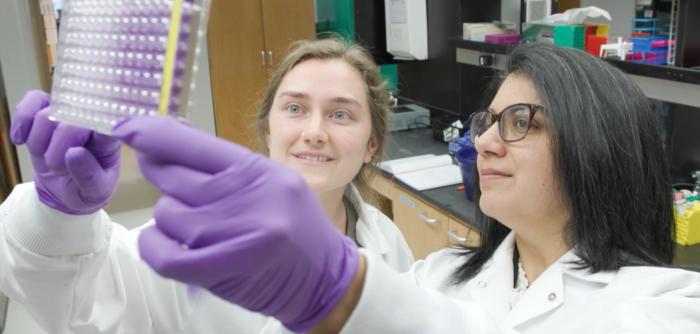Increasing ventilation in child-care settings may not always be effective at preventing flu virus spread, according to a new study published by a team of researchers at Emory University, University of Pittsburgh School of Medicine, and Virginia Tech.

Credit: Emory University
Increasing ventilation in child-care settings may not always be effective at preventing flu virus spread, according to a new study published by a team of researchers at Emory University, University of Pittsburgh School of Medicine, and Virginia Tech.
The spread of flu viruses is commonly studied in animal models that don’t mimic the real-life scenarios of the human experience, making it difficult to evaluate strategies that will be effective in common places where disease spreads rapidly, such as childcare settings. As reported online and in a coming print issue of the journal Proceedings of the National Academy of Sciences (PNAS), the team created a play-based model using ferrets to study the spread of flu in a setting that closely mimics a childcare venue in order to help tackle this issue. In their scenario, one infected ferret interacted with four other uninfected animals for a few hours within a playpen area that also included numerous toys and surfaces.
“Ferrets are great models for kids because they are playful animals and exhibit many behaviors seen with children in real life, such as close-contact interactions and playing with toys,” says Seema S. Lakdawala, PhD, corresponding author and associate professor at Emory University’s School of Medicine. “Additionally, they also exhibit key symptoms of influenza that are seen in infected humans.”
Testing out both high and low ventilation conditions, the researchers examined how many ferrets got sick and the levels of virus in the air and on surfaces. They found that approximately the same number of animals got sick in both venitilation conditions. Although the team did observe slightly less virus in the air with higher ventilation, they measured similar amounts of virus on objects within the playpen. The authors also tracked the behaviors of the ferrets in the playpen and found that the longest ferret-ferret interactions did not define which ferrets got sick. Therefore, other close-range behaviors and/or a combination of interactions with contaminated toys and the infected donor may be more important for virus spread in a close-range exposure scenario.
“Our findings highlight the importance of mimicking real-world settings when examining how interventions affect virus transmission,” says lead author Nicole Rockey, PhD, a former post doc in Lakdawala’s lab and now an assistant professor at Duke University. “This has significant implications for devising public health strategies that can more effectively stem the spread of infections.”
While increased ventilation was not effective in reducing flu virus spread in this play-based model, it may still prove effective in other situations, like within office buildings with adults that do not exhibit as much close-contact behavior as children.
“The need for multiple layers of interventions is critical to reduce the spread on respiratory viruses in communities. There is no magic bullet that will eliminate all transmission,” says Lakdawala.
This research is part of a larger program aimed at mitigating the spread of flu in childcare centers, and includes surveillance in childcare centers in Michigan with aerosol sampling devices designed by researchers at Virginia Tech and University of Michigan.
“The ferret playpen model allows us to manipulate the environment in a real-world-like scenario so that we can test the potential of different interventions deployed in childcare centers,” says Linsey Marr, PhD, professor at Virginia Tech and lead principal investigator for the MITIGATE FLU program.
Future work using the the play-based ferret model will focus on defining the specific behaviors that contribute to the successful spread of flu virus from an infected ferret to a recipient animal. Additionally, the team hopes to use this model to examine whether other interventions, such as air filtration devices, reduce transmission in order to help inform implementation of mitigation strategies in the childcare settings.
Citation: Seema Lakdawala, Nicole Rockey, Linsey Marr, Valerie Le Sage, Meredith Shepard, Anice C. Lowen, Herek Clack, Aaron J. Prussin II. “Ventilation does not affect close range transmission of influenza virus in a ferret playpen setup,” Proceedings of the National Academy of Sciences (PNAS). Aug. 6, 2024. DOI: 10.1073/pnas.2322660121.
Funding: This research was funded by Flu Lab, an organization that supports efforts to advance innovative solutions to persistent problems in the prevention and treatment of influenza.
Media Contact:
Georgia Parmelee
Director of Health Sciences Media Relations
Emory University
georgia.robert.parmelee@emory.edu
Journal
Proceedings of the National Academy of Sciences
Method of Research
Experimental study
Subject of Research
Animals
Article Title
Ventilation does not affect close-range transmission of influenza virus in a ferret playpen setup
Article Publication Date
6-Aug-2024



